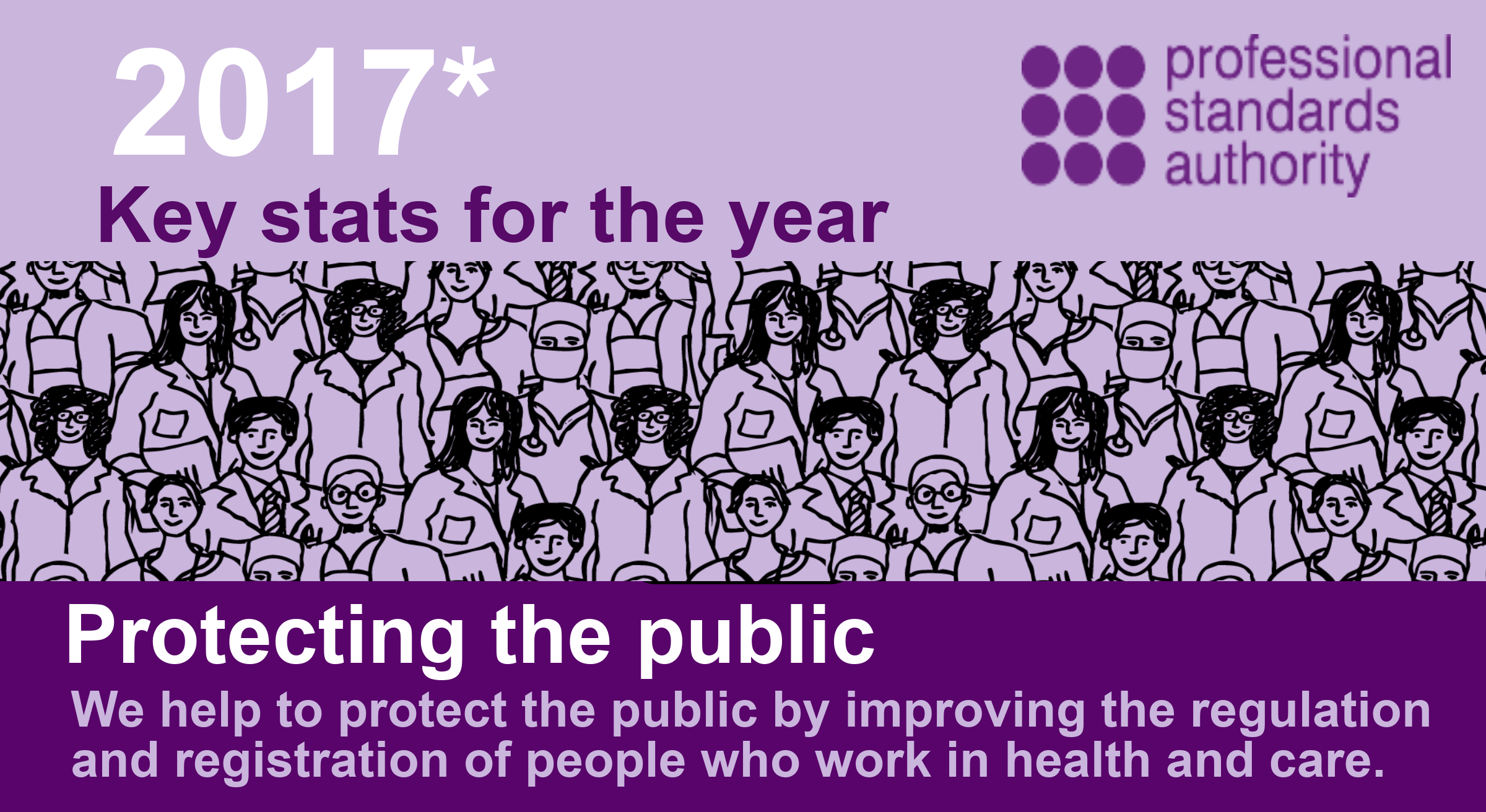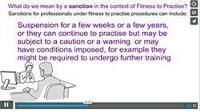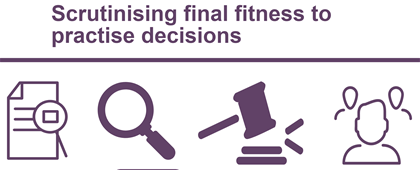Regulatory news

Scrutinising final fitness to practise decisions
Recent Court judgments
Since our last newsletter in October, the High Court has heard two more of our appeals against final fitness to practise decisions.
A panel decision which failed to take account of the serious nature of the charges against a Nursing and Midwifery Council registrant
We appealed a decision because of a finding of no impairment by the NMC’s panel. We believed that the decision did not take into account the serious nature of the charges against the registrant. The registrant – a nurse – was found to have authorised inappropriate removal of clothing searches of two vulnerable patients who were suspected of smuggling cannabis onto the ward. The registrant instructed the patients to squat whilst naked and then told colleagues to touch the patients’ genitalia as part of the search. The registrant was also found to have authorised the seclusion of two patients in psychiatric intensive care without clinical justification. The NMC’s panel did not find the registrant’s fitness to practise impaired. We appealed this decision and the NMC agreed with our appeal, but the registrant opposed the three arguments we put forward:
- the panel’s finding of no impairment failed to have adequate regard to the seriousness of the registrant’s misconduct
- the finding of no impairment was based on errors by the panel which had failed to consider the registrant’s denial of the most serious charges, and the evasive and inconsistent nature of his evidence
- insufficient reasons.
The Court upheld the first two grounds of our appeal, referring to the particularly vulnerable nature of the patients and the gross breach of trust and relevant policies/guidance as well as the importance of the duty of candour in such circumstances. As the Court found in favour of the Authority on the first two grounds, there was no need for it to rule on the third ground. The Court ordered that the panel’s original decision should be substituted by a finding of impairment and be remitted to an NMC panel to decide on an appropriate sanction.
A panel decision which ruled there was no case to answer based on the Nursing and Midwifery Council’s poor investigation and decision to offer no evidence
The second appeal was heard in December and also related to an NMC panel decision. The judgment was handed down on Friday, 19 January and this story was updated on 23 January 2018.
The NMC had offered no evidence on a charge that the registrant – a nurse – had been directly or indirectly responsible for non-accidental injuries caused to her baby. The NMC’s panel found there was no case to answer.
We were concerned that, though the NMC did have evidence which could establish a case to answer, it had had not been provided to the panel. We were also concerned that the NMC had not made sufficient efforts to obtain documents from the Family Court relevant to the charge and did not provide enough information to the panel about evidence that may have been available. The registrant did not oppose the Authority’s appeal, but the NMC argued that it was disproportionate to obtain documents from the Family Court and that even if the charge had been found proved, it could not have resulted in risk of harm to the public or damage to the reputation of the nursing profession.
The Court found for the Authority, criticising the NMC’s decision to offer no evidence and commented on the quality of the NMC’s investigation and the lack of information it provided to enable the panel to determine whether there was a case to answer. The Court ordered that the case be remitted to an NMC panel for hearing in respect of the charge and for the NMC to decide whether further evidence should be obtained.
Cases settled
Since our last newsletter, we have settled three cases by agreement from all parties involved (the Authority, the regulator and the registrant). Two of these cases related to decisions by NMC panels. The first case involved a midwife who had demonstrated a lack of competence and the panel had imposed conditions of practice for 18 months. We were concerned that the conditions imposed on the registrant only required indirect supervision – the registrant had already undergone supported supervision with no sustained improvement – so the panel’s reasoning for its decision to impose conditions was insufficient. All parties agreed to uphold the appeal and the previous conditions were replaced with conditions for 12 months.
These conditions required the completion of relevant midwifery training and included a return to practice course. The new conditions also required the registrant only to work under direct supervision and to complete a personal development programme in conjunction with a manager or mentor.
The second case related to a nurse in a care home facing allegations of poor care provided to a resident. The NMC decided to offer no evidence at the hearing and the panel found there was no case to answer. We had concerns relating to the registrant making retrospective entries in the resident’s records and the NMC’s failure to bring a charge of dishonesty against the registrant. The Authority argued that in those circumstances, the panel was unable to determine whether there was a case to answer. The Authority, the NMC and the registrant agreed that the Authority’s appeal be upheld. The Court of Session in Scotland agreed and ordered the case to be remitted to an NMC panel for a new hearing with a dishonesty charge included.
The third case was a GMC appeal of a Medical Practitioners Tribunal decision that the Authority joined as an interested party. The case involved a doctor who had conducted spinal surgery on the wrong part of the spine. When the patient complained of no improvement to his back pain, the registrant performed a second surgery to correct his original error but did not tell the patient. The GMC’s panel had found the registrant to be impaired but had imposed no sanction. We were concerned that the GMC had not included an allegation of dishonesty against the registrant for failing to disclose his error to the patient or his employer and raised this as a separate argument in the appeal. The Authority, the GMC and the registrant agreed that the appeal should be upheld and the registrant was subject to a sanction – suspended from practising for three months.
Cases waiting to be heard by the Court
There are currently two appeals (submitted under Section 29) awaiting hearing before the High Court.

Not sure why we appeal some final fitness to practise decisions. Watch this short animation which explains more about it.
Fitness to Practise seminar: regulators’ staff identify nine essential elements needed to create a ‘good’ fitness to practise process
“Great event, many thanks. Really interesting and usefully thought provoking…”
“..Thank you for putting together such an informative day…”
In November, we brought together directors of fitness to practise, operational heads and senior staff responsible for investigation and adjudication from each of the nine health and care regulators we oversee. The theme of the seminar was on ‘thresholds and seriousness.’
Representatives from the Solicitors Regulation Authority, the National College of Teaching and Leadership, the Care Quality Commission and the Parliamentary and Health Service Ombudsman also set out how they approach difficulties in defining the threshold for regulatory action and ensuring consistency in decision-making.
The registrant perspective was brought by Mary O’Rourke QC, a barrister with extensive experience of representing registrants appearing before fitness to practise panels. She highlighted the difficulties that practitioners can face when they are subject to an investigation. This can include the expense of legal representation, the intimidating nature of the proceedings as well as the impact delays and interim orders can have on practitioners who may already be suffering from ill health or be vulnerable.
Six key questions
Delegates were asked to consider and then discuss six key questions related to fitness to practise processes. These includedg how regulators can retain public confidence and credibility, what is ‘serious’ in an fitness to practise context, what would a good fitness to practise process would look like, as well as the challenges facing regulators over the next three years.
What would a ‘good’ fitness to process look like?
Delegates identified nine essential elements. These are:
- Simplicity and clarity
- Fairness and transparency
- Communication
- Timeliness
- Quality
- Consistency
- Efficiency
- Cost
- Impact.
It was agreed that quality needed to be assessed across all stages of the fitness to practise process.
Other suggestions/themes that came out of the discussions that regulators should consider, included:
- Be aware of the dangers of operating in a ‘bubble’, subject to rigid legislative requirements and impenetrable terminology
- Clear signposting about how to make complaints, simplifying language and terminology used and improved communication to keep participants updated
- To bear in mind the different perspectives of all participants in the process
- The need to demystify fitness to practise and improve both public and registrant understanding. Consistency in regulatory approach and decision-making are crucial to achieve this
- Linked to this is the need to establish a clear understanding amongst the regulators about when regulatory intervention is warranted
- To help this, regulators could consider the potential to work together to establish an inter-regulatory Sanctions Advisory Panel to further aid with consistency and decision-making, as well as supplementing their existing (indicative sanctions) guidance with detailed case studies
- More research is needed to help understand public attitudes, especially about types of conduct, the appropriate sanction for categories of case, and the effectiveness of remediation
- The move away from a reactive, adversarial approach to fitness to practise and instead a focus on preventative work, including the need for regulators to share learning and good practice.
| How fitness to practise might look in the future: one week left to respond to government consultation on reforming regulation
This story was updated on 24 January as the consultation has now closed but you can see how we responded.
If you are interested in reform of fitness to practise processes, you can respond to the government’s consultation ‘Promoting professionalism, reforming regulation’ but the deadline is fast approaching – just a week to go 23 January.
We have produced a special report Right-touch reform – which sets out our views on why regulation needs to be reformed. We want to stimulate debate and discussion and help anyone interested in responding to the consultation. Right-touch reform includes a chapter on fitness to practise processes. You can find out more in our Policy and Research update and/or:
|
Reviewing the regulators
Performance reviews
We will publish our next performance reviews in early February. They will be for the General Medical Council and the Pharmaceutical Society of Northern Ireland – so keep a look out on our website if you want to know how they are meeting the Standards of Good Regulation.
Reviewing the Standards of Good Regulation
In our last newsletter we provided an update on our consultation on whether the Standards of Good Regulation should be reviewed and the two different approaches we could take to revising them. A summary of the responses went to our Board in November and is also available to read on our website.
What happens next?
We have provided a fuller report to our Board for their January meeting. We will then look at developing our proposed approach and will consult on this later this year. We envisage that the new Standards could be in place for the 2019 round of performance reviews.
Fitness to Practise/Reviewing the regulators: 2017 round-up of key statistics
We were very busy in 2017, we are now on track to equal or even increase how many fitness to practise decisions we scrutinised in 2016/17. See more statistics in our 2017 round-up infographic.
